七年级英语(下)语法(形容词)
初一英语形容词和副词语法知识总结(讲解+考点+综合练习):形容词和副词
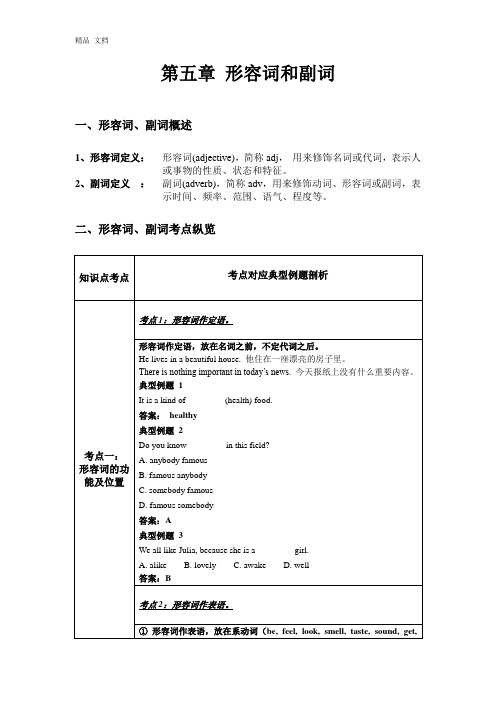
第五章形容词和副词一、形容词、副词概述1、形容词定义:形容词(adjective),简称adj,用来修饰名词或代词,表示人或事物的性质、状态和特征。
2、副词定义:副词(adverb),简称adv,用来修饰动词、形容词或副词,表示时间、频率、范围、语气、程度等。
二、形容词、副词考点纵览三、综合练习( )1. –If you don’t like the red coat, how about the green one?–OK, but do you have _______ size in green? This one is a bit small for me.A. a bigB. a biggerC. the bigD. the bigger( )2. –Mum, I think I’m _______ to get back to school.–Not really, my dear. You’d better stay at home for anoth er day or two.A. so wellB. so goodC. well enoughD. good enough ( )3. –What delicious cakes! –They will taste _______ with butter.A. goodB. betterC. badD. worse( )4. –Mr. Zhou , of all the students in our group, who lives _______ ?–I think Li Lei does.A. farB. fartherC. farthestD. the farther( )5. With a history of more than 1,400 years, ZhaoZhou Bridge is the _______ stone arch bridge in the world .A. oldB. olderC. oldestD. elder( )6. Bob never does him homework _______ Mary. He makes lots of mistakes.A. so careful asB. as carefully asC. carefully asD. as careful as ( )7. A: How can I speak English _______ you?B: You’d better speak more, I think.A. as good asB. more thanC. as well asD. as much as( )8. Your English is good. I’ll try my best to speak it as _______you do.A. clearly asB. clear asC. clearer thanD. more clearly ( )9. –Is your mother badly ill?–No, _______ , only a little cold.A. serious anythingB. serious nothingC. nothing seriousD. anything serious( )10. I’m not sure if I’m going to Tim’s party; I may go to the concert _______ .A. onlyB. insteadC. earlyD. late( )11. Although they are brothers, they are the _______ opposite of one another.A. veryB. justC. fewD. little( )12. The new Bright Restaurant is _______ than the old one. Moore and more people like to eat there.A. goodB. betterC. badD. worse( )13. Wang Ping does _______ in physics that I missed the first class.A. badlyB. Most badlyC. worseD. worst( )14. I got up so _______ this morning that I missed the first class.A. earlyB. lateC. quietlyD. neatly( )15. –Do you enjoy traveling by plane?–No. It’s _______ expensive.A. much moreB. more muchC. too muchD. much too( )16. I’m afraid the headmaster is _______ busy to meet the visitors.A. too muchB. much tooC. so muchD. much too( )17. How beautifully she sings! I’ve never heard _______ .A. the better voiceB. a good voiceC. the best voiceD. a better voice( )18. You do well in your lessons. I’m _______ you will pass the exam.A. sureB. afraidC. sadD. sorry( )19. –Who is _______ in your class?–Fred.A. tallB. tallerC. tallestD. the tallest( )20. –What do you think of the football match?–Wonderful! The Chinese football team has never played _______ .A. betterB. bestC. worseD. worst( )21. The population of China is _____ than _____ of any other country in the world.A. larger , the oneB. more , thatC. larger , thatD. more , the one ( )22. There is much wine here, but _______ people want to drink it.A. manyB. a littleC. fewD. a few( )23. People speak ______ of the film Not One Less. It is really necessary for every child to go to school.A. loudB. loudlyC. highD. highly( )24. She always finishes her homework on time. She ______ leaves it for tomorrow.A. alwaysB. neverC. usuallyD. sometimes( )25. The football match was _______, so the boys were _______ about it.A. excited , excitingB. exciting, excitedC. excited , excitedD. exciting , exciting( )26. Playing table tennis isn’t difficult. You can learn it _______.A. easyB. easilyC. quickD. hardly( )27. We Chinese always put our family name _______.A. lastB. nearlyC. firstD. in the middle ( )28. This kind of T-shirt look _______ and sells _______ in the market.A. nice, goodB. well , wellC. nice , wellD. good , nice( )29. The light in the room wasn’t _______ for me to read.A. brightly enoughB. enough brightlyC. enough brightD. bright enough( )30. –Look, this digital camera is really cheap! It’s only five hundred yuan.–The _______ , the better. I’m short _______ money, you know.A. cheaper , ofB. cheap, forC. expensive , ofD. more expensive , for( )31. Which subject do you like _______ , math, Chinese or English?A. betterB. bestC. wellD. very much( )32. _______ little water is not enough for _______ many people.A. Such , soB. So , soC. Such , suchD. So , such( )33. English is spoken by _______ people.A. a lotB. much manyC. a large number ofD. a great deal of ( )34. –Isn’t that Mary?–Yes, she always has a(an) _______ smile on her face.A. aloneB. kindlyC. ownD. friendly( )35. –Do you prefer music to drawing?–No. I like drawing _______.A. wellB. mostC. betterD. best( )36. Since China has been a member of the WTO, English is ______ useful than before.A. moreB. mostC. muchD. very( )37. Can you speak a little louder? I can _______ hear you.A. hardB. reallyC. hardlyD. clearly( )38. China has a _______ population and long history.A. manyB. largeC. muchD. big( )39. Do you have _______ to say?A. important anythingB. anything importantC. important somethingD. something important( )40. Which is _______ , English or Chinese?A. interestingB. interestingerC. more interestingD. most interesting( )41. –The TV programme is boring. Shall we play chess intead?–All right. That is _______ than watching a boring programme.A. very goodB. much goodC. very betterD. much better( )42. –Mum, could you buy me a dress like this?–Certainly, we can buy _______ one than this, but _______ this.A. a better, better thanB. a worse , as good asC. a cheaper , as good asD. a more important , not as good as ( )43. Let’s enjoy the song Yesterday Once More. It sounds _______.A. wellB. sadlyC. niceD. bad( )44. –Is the physics problem _______ ?–Yes. I can work it out _______.A. easy , easilyB. easy, easyC. easily , easyD. easily , easily ( )45. Hainan is a very large island. It’s the second _______ island in China.A. largeB. largerC. largerD. most large( )46. What a _______ cough! You seem _______ ill.A. terrible, terriblyB. terribly , terribleC. terrible , terribleD. terribly , terribly ( )47. I’m not sure whether Mary can sing _______ Mabel.A. as well asB. as good asC. so good asD. as better as( )48. Chinese is _______ more difficult than English.A. mostB. veryC. manyD. much( )49. The _______ old man told his son to be a good boy.A. diedB. deadC. dyingD. death( )50. Today my sister is feeling _______ to go to the factory.A. enough goodB. good enoughC. well enoughD. enough well参考答案精品文档1—5 B C B C C6—10 B C A C B11—15 A B D B D16—20 B D A D A21—25 C C D B B26—30 B C C D A31—35 B B C D C36—40 A C B B C文档说明(Word文档可以删除编辑)专注于精品文档:中考、高考、数学语文英语试卷、高中复习题目、小学试卷教案合同协议施工组织设计、期中、期末等测试,本文档目的是为了节省读者的工作时间,提高读者的工作效率,读者可以放心下载文档进行编辑使用.文档来源网络改编,审核有可能疏忽,如果有错误或侵权,请联系本店马上删除。
牛津译林版英语七年级下册Unit8 【语法讲解】:形容词
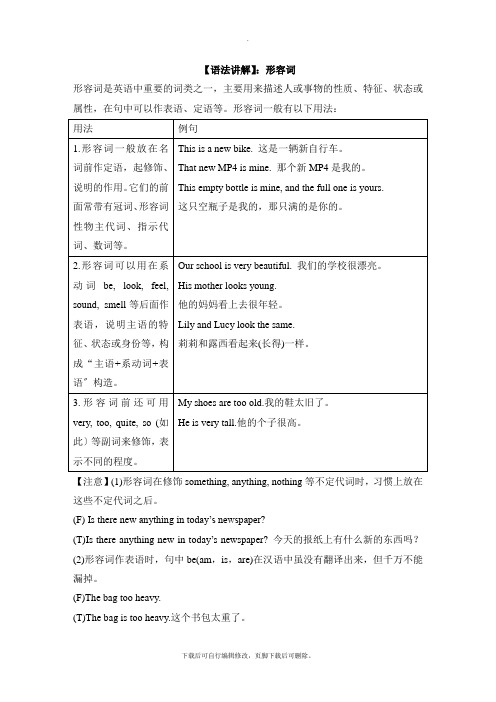
【语法讲解】:形容词
形容词是英语中重要的词类之一,主要用来描述人或事物的性质、特征、状态或属性,在句中可以作表语、定语等。
形容词一般有以下用法:
【注意】(1)形容词在修饰something, anything, nothing等不定代词时,习惯上放在这些不定代词之后。
(F) Is there new anything in today’s newspaper?
(T)Is there anything new in today’s newspaper? 今天的报纸上有什么新的东西吗?
(2)形容词作表语时,句中be(am,is,are)在汉语中虽没有翻译出来,但千万不能漏掉。
(F)The bag too heavy.
(T)The bag is too heavy.这个书包太重了。
(3)为了帮助我们更好地掌握形容词的用法,现提供口诀一那么,供参考:形容词,用法多,作定作表都许可;
作定位于名词前,作表放在系之后;
如有不定代词现,定在它的后面见;
副词是我的好朋友,它在前来我在后。
人教版英语七年级下册第三单元形容词语法知识点总结

人教版英语七年级下册第三单元形容词语法知识点总结本文档总结了人教版英语七年级下册第三单元的形容词语法知识点。
1. 形容词的基本概念- 形容词是一种修饰名词或代词的词语,用来描述事物的特征、性质或状态。
- 形容词通常放在名词前面,用来限定名词的范围。
2. 形容词的基本用法- 形容词作定语- 形容词放在名词前面,用来修饰名词,增添形容词所描述的特征。
- 例如:a beautiful flower(一个美丽的花)- 形容词作表语- 形容词放在系动词后面,用来描述主语的特征。
- 例如:The weather is sunny.(天气晴朗。
)- 形容词作宾语补足语- 形容词放在及物动词的后面,用来补充说明宾语的特征。
- 例如:They found the book interesting.(他们发现这本书很有趣。
)3. 形容词的比较级和最高级- 形容词的比较级用于比较两个或多个事物的特征。
- 比较级的构成:原形 + er + than- 例如:taller than(比...更高)- 形容词的最高级用于比较三个或三个以上事物的特征。
- 最高级的构成:the + 原形 + est- 例如:the tallest(最高的)4. 形容词的位置- 形容词一般放在名词前面,但有时也可以放在名词后面。
- 当形容词修饰不可数名词或定物名词时,通常放在名词前面。
- 例如:a beautiful girl(一个美丽的女孩)- 当形容词修饰人或个体名词时,通常放在名词后面。
- 例如:a boy happy(一个快乐的男孩)以上是人教版英语七年级下册第三单元的形容词语法知识点总结。
希望对你有所帮助!。
七年级英语形容词知识点

七年级英语形容词知识点形容词是英语中重要的语法成分之一,它用于描述人、事、物的属性和特征,为句子增添了更多的描述信息和更丰富的意义。
在七年级英语学习中,形容词知识是基础但又至关重要的一部分,下面本文将为您详细介绍七年级英语形容词的知识点。
1. 形容词的定义形容词是一种用来描述人、事、物的外貌、性质、状态等特征的词语。
如果没有形容词,我们的语言就会变得单调无味,说出来的话也不具有真实感和生动感。
2. 形容词的分类形容词可以根据其所描述的名词的数量分类,如:(1) 对单数名词修饰的形容词,如:a big house(一幢大房子)、the tall boy(那个高个子男孩)等。
(2) 对复数名词修饰的形容词,如:two beautiful girls(两个漂亮的女孩)、the red apples(红色的苹果)等。
(3) 对不可数名词修饰的形容词,如:some hot tea(一些热茶)、the fresh air(清新的空气)等。
3. 形容词的用法形容词常用于句子中作定语、表语和宾补,具体如下:(1) 定语:修饰名词或代词,一般放在名词或代词前面。
如:a cute puppy(一只可爱的小狗)、the green grass(绿色的草地)等。
(2) 表语:与主语构成谓语表语结构,说明主语的状态或特征,常放在be动词、感官动词、变化动词和使役动词后面。
如:The soup is delicious.(这道汤很美味。
)(3) 宾补:在某些及物动词的后面,表示行为的结果或影响,常用于以下动词:make、 keep、 find、 call、 name、 elect、appoint、 choose、 consider、 leave、 paint、 wash 等。
如:I found the book interesting.(我觉得这本书很有趣。
)4. 形容词的比较级和最高级形容词的比较级和最高级用于比较两个或多个事物的特征和属性的高低和优劣,比较级表示相对程度,最高级表示最高程度。
冀教版七年级下Unit 1-8英语形容词表

冀教版七年级下Unit 1-8英语形容词表Unit 1 - Me and My Friends- friendly 友好的- outgoing 外向的- shy 害羞的- quiet 安静的- active 活跃的- hardworking 努力的- lazy 懒惰的- smart 聪明的- funny 有趣的- serious 严肃的Unit 2 - My School Life- boring 无聊的- interesting 有趣的- difficult 困难的- easy 容易的- important 重要的- helpful 有帮助的- useless 无用的- useful 有用的- challenging 具有挑战性的- enjoyable 令人愉快的Unit 3 - Music- lovely 可爱的- modern 现代的- popular 流行的- melodious 悦耳的- noisy 嘈杂的- peaceful 平静的- rhythmic 有节奏的- soft 柔和的- sweet 甜美的- classical 古典的Unit 4 - Science and Technology - advanced 先进的- creative 创造性的- dangerous 危险的- exciting 令人兴奋的- helpful 有帮助的- useless 无用的- mechanical 机械的- technical 技术性的- virtual 虚拟的- innovative 创新的Unit 5 - Festivals - cheerful 快乐的- colorful 多彩的- grand 盛大的- traditional 传统的- exciting 令人兴奋的- joyful 欢乐的- lively 生动的- peaceful 和平的- religious 宗教的- special 特别的Unit 6 - Food and Health - healthy 健康的- convenient 方便的- delicious 美味的- fatty 肥的- fresh 新鲜的- natural 自然的- nutritious 有营养的- salty 咸的- sweet 甜的- sour 酸的Unit 7 - Hobbies- creative 创造性的- fun 有趣的- interesting 有趣的- relaxing 令人放松的- challenging 具有挑战性的- enjoyable 令人愉快的- exciting 令人兴奋的- healthy 健康的- expensive 昂贵的- cheap 廉价的Unit 8 - Life Online- convenient 方便的- dangerous 危险的- interesting 有趣的- popular 流行的- virtual 虚拟的- addictive 上瘾的- creative 创造性的- informative 信息量大的- educational 有教育意义的- positive 积极的。
七年级英语下册语法总结
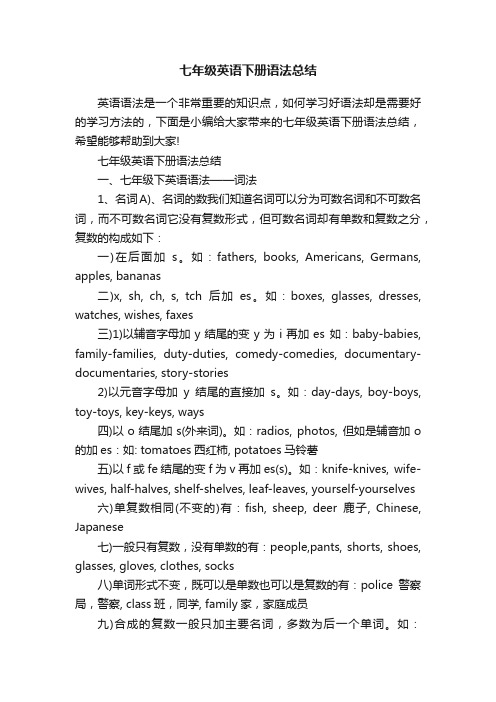
七年级英语下册语法总结英语语法是一个非常重要的知识点,如何学习好语法却是需要好的学习方法的,下面是小编给大家带来的七年级英语下册语法总结,希望能够帮助到大家!七年级英语下册语法总结一、七年级下英语语法——词法1、名词A)、名词的数我们知道名词可以分为可数名词和不可数名词,而不可数名词它没有复数形式,但可数名词却有单数和复数之分,复数的构成如下:一)在后面加s。
如:fathers, books, Americans, Germans, apples, bananas二)x, sh, ch, s, tch后加es。
如:boxes, glasses, dresses, watches, wishes, faxes三)1)以辅音字母加y结尾的变y为i再加es 如:baby-babies, family-families, duty-duties, comedy-comedies, documentary-documentaries, story-stories2)以元音字母加y结尾的直接加s。
如:day-days, boy-boys, toy-toys, key-keys, ways四)以o结尾加s(外来词)。
如:radios, photos, 但如是辅音加o 的加es:如: tomatoes西红柿, potatoes马铃薯五)以f或fe结尾的变f为v再加es(s)。
如:knife-knives, wife-wives, half-halves, shelf-shelves, leaf-leaves, yourself-yourselves六)单复数相同(不变的)有:fish, sheep, deer鹿子, Chinese, Japanese七)一般只有复数,没有单数的有:people,pants, shorts, shoes, glasses, gloves, clothes, socks八)单词形式不变,既可以是单数也可以是复数的有:police警察局,警察, class班,同学, family家,家庭成员九)合成的复数一般只加主要名词,多数为后一个单词。
七年级下册英语第一单元《grammar》笔记
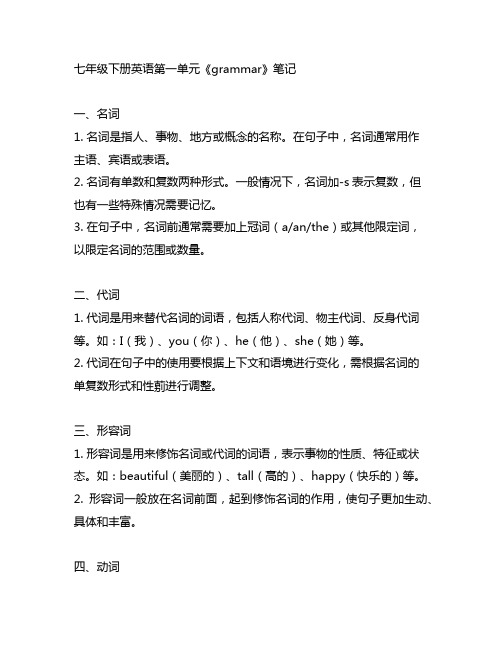
七年级下册英语第一单元《grammar》笔记一、名词1. 名词是指人、事物、地方或概念的名称。
在句子中,名词通常用作主语、宾语或表语。
2. 名词有单数和复数两种形式。
一般情况下,名词加-s表示复数,但也有一些特殊情况需要记忆。
3. 在句子中,名词前通常需要加上冠词(a/an/the)或其他限定词,以限定名词的范围或数量。
二、代词1. 代词是用来替代名词的词语,包括人称代词、物主代词、反身代词等。
如:I(我)、you(你)、he(他)、she(她)等。
2. 代词在句子中的使用要根据上下文和语境进行变化,需根据名词的单复数形式和性莂进行调整。
三、形容词1. 形容词是用来修饰名词或代词的词语,表示事物的性质、特征或状态。
如:beautiful(美丽的)、tall(高的)、happy(快乐的)等。
2. 形容词一般放在名词前面,起到修饰名词的作用,使句子更加生动、具体和丰富。
四、动词1. 动词是表示动作、状态或行为的词语,是句子的核心部分。
动词根据不同的时态、人称和语态等进行变化。
2. 动词有不规则变化的情况,需要牢记各种不规则动词的过去式、过去分词和第三人称单数形式。
五、副词1. 副词是用来修饰动词、形容词、其他副词或整个句子的词语,表示时间、地点、程度、方式等概念。
2. 副词在句子中的位置比较灵活,通常放在被修饰的词语前或后,起到对句子的修饰和补充作用。
六、句子结构1. 英语句子一般由主语、谓语和宾语构成,也可能包括其他成分如定语、状语等。
2. 句子结构的正确与否对句子的表达和理解至关重要,需要注意主谓一致、时态一致等问题。
七、语法练习1. 通过大量的语法练习,加强对英语语法规则的掌握和运用能力,提高语言表达和书面表达能力。
2. 在练习过程中,要多注意句子的结构和成分的搭配,尤其注意上下文和语境的合理运用。
总结:英语语法是英语学习的基础,掌握好英语的基本语法规则非常重要。
通过反复学习和练习,加强对名词、代词、形容词、动词、副词、句子结构等的掌握,可以提高语言运用的准确性和丰富性,为进一步的英语学习打下坚实的基础。
七年级下册英语语法知识点
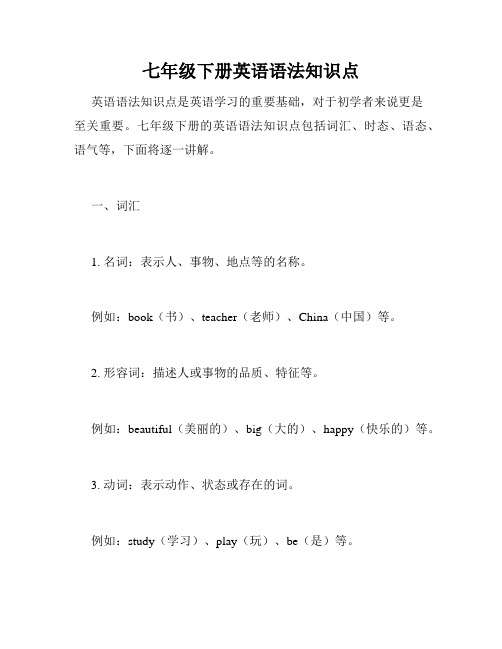
七年级下册英语语法知识点英语语法知识点是英语学习的重要基础,对于初学者来说更是至关重要。
七年级下册的英语语法知识点包括词汇、时态、语态、语气等,下面将逐一讲解。
一、词汇1. 名词:表示人、事物、地点等的名称。
例如:book(书)、teacher(老师)、China(中国)等。
2. 形容词:描述人或事物的品质、特征等。
例如:beautiful(美丽的)、big(大的)、happy(快乐的)等。
3. 动词:表示动作、状态或存在的词。
例如:study(学习)、play(玩)、be(是)等。
4. 副词:修饰动词、形容词或其他副词的词语。
例如:often(经常地)、very(非常)、never(从不)等。
5. 介词:连接名词或代词与其他词语的词语。
例如:in(在)、on(在……上)、at(在……处)等。
6. 代词:代替名词或名词的词语。
例如:he(他)、she(她)、it(它)等。
7. 数词:表示数量的词语。
例如:one(一)、two(二)、three(三)等。
8. 冠词:用来限定名词的特定含义的词语。
例如:a(一个)和the(那个)。
二、时态时态表示动词所发生的时间,英语中有三个基本的时态:现在时、过去时和将来时。
1. 现在时:表示目前正在发生的事情。
例如:I am reading a book.(我正在看书。
)2. 过去时:表示过去发生的事情。
例如:She played basketball yesterday.(她昨天打篮球了。
)3. 将来时:表示将要发生的事情。
例如:We will go to the museum next week.(我们下周去博物馆。
)三、语态语态表示句子主语与动作之间的关系,英语语态有两种:主动语态和被动语态。
1. 主动语态:表示主语执行动作。
例如:She sings a song every day.(她每天唱一首歌。
)2. 被动语态:表示动作的承受者成为句子的主语。
例如:The book was written by him.(这本书是他写的。
- 1、下载文档前请自行甄别文档内容的完整性,平台不提供额外的编辑、内容补充、找答案等附加服务。
- 2、"仅部分预览"的文档,不可在线预览部分如存在完整性等问题,可反馈申请退款(可完整预览的文档不适用该条件!)。
- 3、如文档侵犯您的权益,请联系客服反馈,我们会尽快为您处理(人工客服工作时间:9:00-18:30)。
七年级英语(下)语法(形容词)一、形容词概说:1. 形容词的定义:用来说明或修饰名词、代词的词称为形容词。
2. 形容词在句子中的位置及作用:(1)形容词通常放于名词前修饰名词作定语。
如:①I need a beautiful hat. 我需要一顶漂亮的帽子。
(2)形容词通常放于连系动词(如动词be、部分实义动词活用来的连系动词feel, keep, look, sound, taste等)之后作表语。
如:②The price is low. 这个价格很便宜。
(3)形容词还可以放在宾语之后作宾语补足语,补充说明宾语的状态、性质、属性。
如:③We must keep our classroom clean. 我们必须保持我们的教室清洁。
二、重点形容词的用法辨析:1. 由同一个动词在词尾加-ed或-ing变来的两种形容词的区别:(1)在动词词尾加-ing变来的形容词在句子中既可以放于连系动词(如动词be)后作表语,又可以修饰名词作定语,主语一般是事物,通常被用来表示事物的性质、属性;(2)在动词词尾加-ed变来的形容词在句子中只能放于连系动词(如动词be)后作表语,不可以修饰名词作定语,主语一般是人,通常被用来表示人的心理活动。
如:①I feel very (relax). 我感到很轻松。
②We are (surprise) about the (excite) news. 我们对这个令人激动的消息感到惊讶。
( ) ③-What news! -Yes. We are all about it.A. exciting; excitingB. excited; excitedC. exciting; excitedD. excited; exciting2. good与well:两者都表示“好”的意思,用法区别:(1)good是形容词,通常修饰名词作定语或放于连系动词后作表语;(2)well是副词,通常修饰实义动词作状语;(3)此外,well也可以作形容词用,但只能表示“(身体)好的”。
如:①Vegetables are for our health. 蔬菜对我们的身体健康有益。
②-How are you? -I am very . 你好吗?我很好。
③Tom can play the violin very . 吉姆小提琴拉得很好。
3. 只能放于连系动词后面作表语的形容词:afraid(害怕的), well (健康的), ill(生病的)等。
如:(1)The man is ill. 这个人病了。
(正)(2)The ill man is my uncle. 这个病人是我的叔叔。
(误)4. 只能作定语的形容词:little(小的), only(唯一的)等。
如:(1)My elder brother is in Beijing. 我哥哥在北京。
(正)(2)My brother is elder. 我哥哥年龄比较大。
(误)5. 在名词词尾加-ly变来、形式似副词的形容词:lonely, friendly, lively, lovely。
三、形容词常用的句型:1. It (形式主语) + is + adj. (形容词) + for + sb. (表示人的宾语) + to do sth. (动词不定式短语,句子的主语). 意思是“对某人来说,做某事……。
”注意:这一句型中常用描述事物属性的形容词,如important, necessary, difficult, easy, hard, dangerous, safe, useful, pleasant, interesting, impossible等。
如:(1)It’s not easy for them to learn English. 对他们来说,学习英语不容易。
2. Sb. (人,主语) + 动词be + adj. (形容词) + for + sth. (表示事物的宾语). 意思是“某人做某事……。
”同义句:Sb. (人,主语) + 动词be + adj. (形容词) + for + doing sth. (动词-ing形式短语).或是:Sb. (人,主语) + 动词be + adj. (形容词) + to do sth. (动词不定式短语).如:(1)I’m late for school. 我上课迟到。
同义句1:I’m late for (go) to school.同义句2:I’m late (go) to school.四、形容词、副词用法辨析:1. 从汉语意思来看,形容词通常包含有“……的”,副词则包含有“……地”。
如:quick adj. 快的;迅速的quickly adv. 快地;迅速地2. 大部分形容词可以在词尾加上后缀-ly构成副词,变化规则:(1)一般在形容词词尾直接加-ly;(2)以辅音字母加y结尾的形容词,变y为i,然后再加-ly;(3)某些以辅音字母l加不发音的元音字母e结尾的形容词,先去掉e,然后再加-y。
非常)、too(太)等进行修饰。
如:-Why do you like pandas? 你为什么喜欢熊猫?-Because they’re kind of cute.因为它们有点可爱。
4. 形容词、副词的用法区别:(1)大部分形容词通常都可以放于名词前修饰名词作定语;只有少数表示时间、地点的副词可以修饰名词作定语,但是要放于名词之后;(2)形容词通常放于动词be后作表语,副词则要放于实义动词后作状语。
如:①Please be (quick, quickly). 请快点。
②He runs (quick, quickly) to school. 他迅速跑向学校。
③The boy is very (lucky, luckily) to get the cake. 这个男孩非常幸运得到蛋糕。
④The old man walks very (slow, slowly). 这个老人走路很慢。
五、巩固练习:用括号中所给单词的正确形式填空。
1. The cake taste really (good).2. -How is your grandfather? -He is very (good).3. The river runs too (quick) for boats.4. Don’t be (late) for class.5. Don’t arrive (late) for class.6. It is very easy for us (ride) bikes.7. My grandmother is very old. She needs to walk very (slow).8. They live really (far) from the school.9. Jim is often late for (get) home.10. Don’t be (noise) in the library.11. We must keep (quiet) in the classroom.12. Vegetables are (health) food.七年级英语(下)语法(形容词)(答案)一、形容词概说:1. 形容词的定义:用来说明或修饰名词、代词的词称为形容词。
2. 形容词在句子中的位置及作用:(1)形容词通常放于名词前修饰名词作定语。
如:①I need a beautiful hat. 我需要一顶漂亮的帽子。
(2)形容词通常放于连系动词(如动词be、部分实义动词活用来的连系动词feel, keep, look, sound, taste等)之后作表语。
如:②The price is low. 这个价格很便宜。
(3)形容词还可以放在宾语之后作宾语补足语,补充说明宾语的性质、属性。
如:③We must keep our classroom clean. 我们必须保持我们的教室清洁。
二、重点形容词的用法辨析:1. 由同一个动词在词尾加-ed或-ing变来的两种形容词的区别:(1)在动词词尾加-ing变来的形容词在句子中既可以放于连系动词(如动词be)后作表语,又可以修饰名词作定语,主语一般是事物,通常被用来表示事物的性质、属性;(2)在动词词尾加-ed变来的形容词在句子中只能放于连系动词(如动词be)后作表语,不可以修饰名词作定语,主语一般是人,通常被用来表示人的心理活动。
如:①I feel very relaxed (relax). 我感到很轻松。
②We are surprised (surprise) about the excited (excite) news. 我们对这个令人激动的消息感到惊讶。
( C ) ③-What news! -Yes. We are all about it.A. exciting; excitingB. excited; excitedC. exciting; excitedD. excited; exciting2. good与well:两者都表示“好”的意思,用法区别:(1)good是形容词,通常修饰名词作定语或放于连系动词后作表语;(2)well是副词,通常修饰实义动词作状语;(3)此外,well也可以作形容词用,但只能表示“(身体)好的”。
如:①Vegetables are good for our health. 蔬菜对我们的身体健康有益。
②-How are you? -I am very well . 你好吗?我很好。
③Tom can play the violin very well . 吉姆小提琴拉得很好。
3. 只能放于连系动词后面作表语的形容词:afraid(害怕的), well (健康的), ill(生病的)等。
如:(1)The man is ill. 这个人病了。
(正)(2)The ill man is my uncle. 这个病人是我的叔叔。
(误)4. 只能作定语的形容词:little(小的), only(唯一的)等。
如:(1)My elder brother is in Beijing. 我哥哥在北京。
(正)(2)My brother is elder. 我哥哥年龄比较大。
(误)5. 由名词加-ly变来、形式似副词的形容词:lonely, friendly, lively, lovely。
三、形容词常用的句型:It (形式主语) + is + adj. (形容词) + for + sb. (表示人的宾语) + to do sth. (动词不定式短语,句子的主语). 意思是“对某人来说,做某事怎么样。
”注意:这一句型中常用描述事物属性的形容词,如important, necessary, difficult, easy, hard, dangerous, safe, useful, pleasant, interesting, impossible等。
